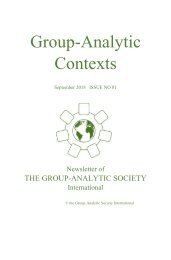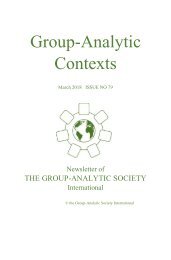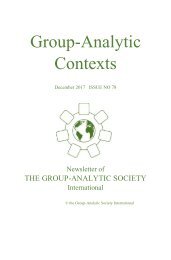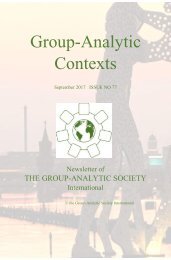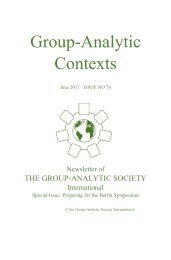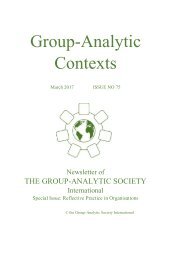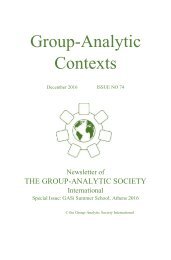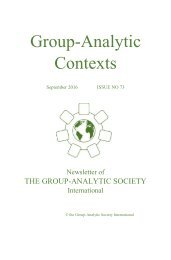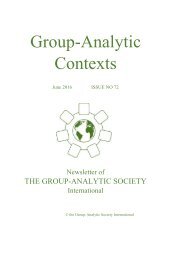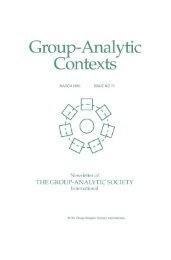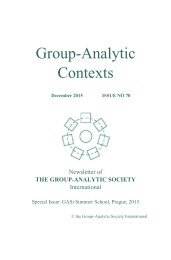Group-Analytic Contexts, Issue 80, June 2018
You also want an ePaper? Increase the reach of your titles
YUMPU automatically turns print PDFs into web optimized ePapers that Google loves.
Newsletter – Summer <strong>2018</strong> 3<br />
Editorial<br />
<strong>Contexts</strong> serves group analysis and GASi in a number of ways. One<br />
of which is to facilitate communication among a diffuse membership<br />
spread across 40 or more countries. While this function is still at the<br />
heart of what this publication is about, it should be acknowledged that<br />
the presence of the Forum, even though it does not include all<br />
members, has to some degree taken over this role. The Forum, always<br />
open 24/7 and requiring no editorial intervention of any kind, apart<br />
from the inner editor of each contributing member, contains<br />
contributions and exchanges ranging from the startlingly banal to the<br />
most well-informed and original – both of which often conflate such<br />
that it is hard to know which is which. The urges to write and to<br />
communicate with the wider membership, both of which are vital to<br />
the survival of <strong>Contexts</strong>, can be more than met by active participation<br />
in GASi’s virtual large group agora. Since <strong>Contexts</strong> became a digital<br />
publication only, it increasingly begins to feel that it has been to some<br />
degree supplanted by the forum as a space through which to be in<br />
touch with GA peers and colleagues. A current thread on the forum,<br />
continuing with issues present in the recent Foulkes weekend,<br />
concerns whether, how and to what degree the forum might also be<br />
impacting our face-to-face encounters. Is our disembodied online<br />
communication in some sense hurting the GASi body?<br />
So, what does this mean for <strong>Contexts</strong>? The commissioning<br />
side of the editor’s role, encouraging and badgering people to write,<br />
sometimes for the first time, has taken on a greater significance and<br />
has become more necessary. I am increasingly drawn to inviting guest<br />
editors to share in this work, developing theme-centred issues. From<br />
time-to-time I receive proposals for special issues, nonetheless I<br />
would like to use this editorial to openly invite others to come forward<br />
and become involved in this way. Some ideas for special issues I have<br />
been hoping to develop, are: GA and social class; applications of large<br />
groups outside of clinical settings; GA and sport. If you think you<br />
might be interested in taking on the guest-editing of any of the above<br />
or have an idea yourself for a special issue, please do not hesitate to<br />
contact me.<br />
This issue covers a number of themes. As someone heavily<br />
involved in the planning of the next GASi Symposium in Barcelona,<br />
I am very pleased to include reports of the co-chairs of the various<br />
committees involved in putting together the Berlin Symposium. There<br />
are always so many lessons to learn and to avoid the feeling that we<br />
are constantly reinventing the wheel, these reports, as well as the



